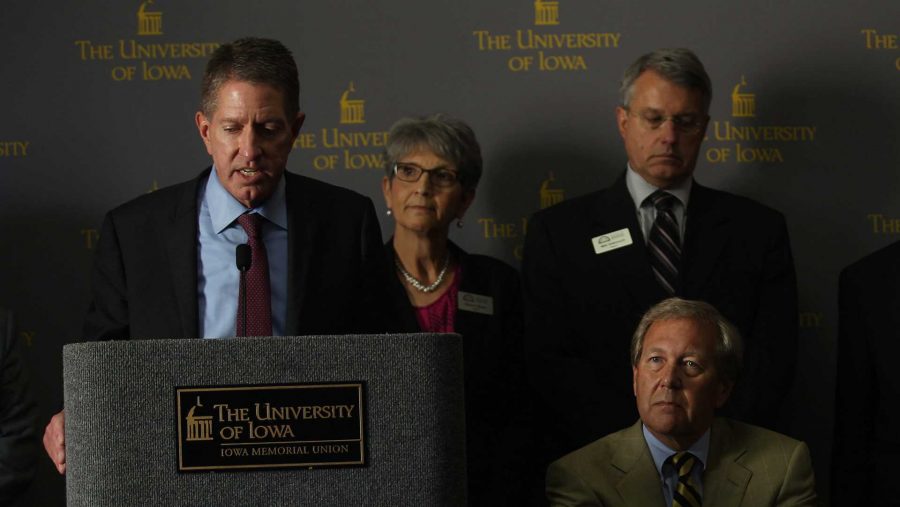After landing on a professors’ association’s list of sanctioned institutions two years ago for not following shared-governance practices in the 2015 presidential search, the University of Iowa could soon be removed.
The American Association of University Professors’ Committee on College and University Governance has recommended the removal of the UI from the sanction list because of improved shared governance. AAUP members will vote on the committee’s recommendation on June 16.
The UI was put on the list in response to the process the state Board of Regents followed in hiring UI President Bruce Harreld. The hiring process was scrutinized because of Harreld’s private meetings with members of the state Board of Regents and for the level of involvement from the UI community. The 21-member search committee was disbanded after semifinalists were selected.
RELATED: University faculty senate eyes AAUP sanction
Pete Snyder, the outgoing UI Faculty Senate president, said the sanctions took its toll on the university and its constituents.
“This is not a list that universities aspire to be on. It’s sort of a black mark on our reputation,” Snyder said. “I think faculty and others on our campus, and I think our Board of Regents as well, have not wanted that black mark to be associated with the University of Iowa. We’re all very proud of our university.”
In response to the sanctions, the Faculty Senate formed a committee tasked with working to get the UI removed from the list. The committee created a best-practices document addressing how faculty should be involved in presidential searches.
Hans-Joerg Tiede, the senior program officer of Department of Academic Freedom, Tenure, & Governance, said the approach the Faculty Senate took in creating the committee and working with the regents was exemplary.
“This is on the shorter side in terms of the length of time on the sanction list, and that shows a real effort on the part of the faculty to reach out and work with the Board of Regents to resolve this,” Tiede said.
RELATED: University of Iowa ponders effect of AAUP sanction
The committee worked with a variety of groups throughout the process, including the local chapter of the AAUP, Faculty Senate officers, the administration, and the regents. Committee Chair Sandra Daack-Hirsch said the committee was thrilled with the recommendation to be removed.
“We had involvement with stakeholders throughout the entire process so that we developed the policies in collaboration with all of those different constituents,” she said. “I think that this process just really proved to everyone that [shared governance] can work and it does work.”
In the process of working to get removed from the sanctioned institutions list, the focus has been on improving the collaborative nature of shared governance at the UI.
“The faculty by themselves can’t make shared governance work better. The president by himself can’t make it better …” Snyder said. “I think what’s improved is just that willingness among both parties to make it work better. Bruce Harreld has been a strong advocate for shared governance, and the Faculty Senate has shown a willingness to work with them.”
RELATED: Timeline of events: UI 2015 presidential-search process
In a May 4 interview with The Daily Iowan, Harreld said the dynamic is strange, because the sanction is against the UI for the regents’ conduct. AAUP bylaws require such sanctions to be against institutions rather than directed against governing boards.
This effort was largely faculty-led, Harreld said, though he has helped faculty engage with the regents and has focused on strengthening shared-governance processes.
“I found myself to be a few years ago the integration point. Very few meetings where faculty, the staff, and students all in the same meeting, and so I was kind of the coordination point and said, ‘This is not good,’ ” Harreld said. “So we’ve actually created a process where we’re all involved in most of the issues simultaneously, which makes it healthier, more creative …”
Snyder said shared governance can always be improved, but he thinks the process of working to remove the sanction was a good start for the UI.
“The benefit of this process that we’ve been through is not just possibly getting removed from the sanctioned list,” Snyder said. “It’s [also] allowed us to heal a lot of wounds that have been opened up through the presidential search process. In many ways, it has helped us to restore our relationship with our administration and with the Board of Regents.”



